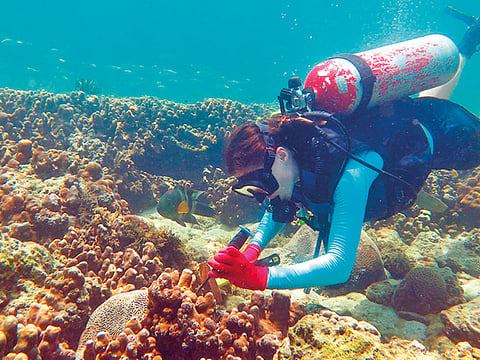Arabian Gulf corals have ‘super genes’ to tolerate heat
NYU Abu Dhabi coral research tackles climate change

Abu Dhabi: Research undertaken by scientists at New York University Abu Dhabi (NYUAD) will help provide new insight into how coral reefs around the world will be able to cope with climate change, the university announced on Thursday.
Rising sea temperatures are a main cause of global coral reef bleaching — when the water is too warm, corals expel the algae living in their tissues, causing the coral to turn white (known as coral bleaching). Major coral bleaching events have occurred around the world, including significant events in Australia on the Great Barrier Reef, and experts expect to see continued damage in the coming years.
Researchers at NYU Abu Dhabi may have found new insight into this global challenge, using corals found in the Arabian Gulf. A team of researchers examined the genetics of a widespread coral to understand how corals survive extreme sea temperatures of 36 degree Celsius or higher in the Arabian Gulf, making them more heat tolerant than any other corals on the planet.
The study, which was published in the scientific journal PLOS One, sought answers to whether these corals have genetically adapted to these extreme conditions or have physiologically acclimated to the heat. To this end, the genetic structure of the coral Platygyra daedalea and its symbiotic algae in the Arabian Gulf and the nearby Gulf of Oman were investigated.
“By looking at both corals and algae, we can get a better idea of whether one or both are involved in Gulf coral thermal tolerance,” said Edward Smith, postdoctoral associate researcher at NYU Abu Dhabi.
A DNA analysis was performed on corals collected from reefs in the Arabian Gulf near Abu Dhabi and from sites in the slightly cooler Gulf of Oman around Fujairah and Muscat. This analysis found some key differences, revealing that the Arabian Gulf corals and their algae are genetically distinct from their counterparts in Gulf of Oman.
Regional adaptation has also led the researchers to conclude that reefs threatened by climate change in the Gulf of Oman or Indian Ocean are unlikely to acquire the so-called “super genes” of Arabian Gulf corals.
Reefs in the Arabian Gulf are the most diverse ecosystems in the region and support major economic industries such as fisheries. “Unfortunately, the conditions that have made Arabian Gulf corals among the hardiest known to science, also makes them vulnerable: they are living in very stressful conditions, and any further stress can push them over the edge,” said John Burt, NYUAD associate professor of biology.
Sign up for the Daily Briefing
Get the latest news and updates straight to your inbox



